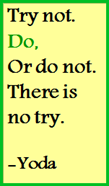Pick up one of the popular self-help books written on the topic of achievement in the last 10 years and chances are you will find a thick section devoted to ‘visioning’. That’s the process of creating a visual picture of what you want to achieve. While knowing what you want to achieve is important, these self-help authors typically gloss over the mechanics and benefits of action – both taking the right action and how to overcome the barriers you will inevitably encounter along the way.
Beginning today and continuing over the next several weeks, I will illuminate the following 3 critical parts for taking effective action so you can begin making progress toward achieving your dreams versus just thinking about them. Today’s article focuses on the first of these three parts.
Part 1: Create clarity and accuracy
Part 2: Recognize and overcome your limiting beliefs
Part 3: Get support
Part 1: Create clarity and accuracy
Let’s start with the foundation that gets the ball rolling in the right direction: Are you clear about what is important to you? Have you taken the time lately to assess your priorities and whether or not they will deliver the results you want?
The lessons on creating clarity and accuracy can be summed up with two adages:
 The first adage is: “Big rocks first.”
The first adage is: “Big rocks first.”
The idea behind this adage is that it is critical to take care of the most important things in life first. Good health, family, children, friends, goals, and dreams are examples of the “big rocks” of life.
To learn about the idea of “big rocks first”, enjoy a short video Fill Your Bucket Well, or this short video The Empty Pickle Jar, or read this article “Big Rocks First” and gain insight about how you can make even the busiest life a bit sweeter. By focusing on the big rocks of life first, we take time to spend quality time with our spouse, enjoy the company of our friends, play with our grandchildren, or travel to places we’ve always wanted to see. If we focus on the little things, sand and pebbles, we’ll never be able to get the big things accomplished.
Are you clear about your own big rocks? Do they fit in your jar, or is your jar already too full with pebbles and sand?
The second adage is: “An accurate plan poorly implemented is more successful than a vague or generic plan implemented with brilliant precision.”
This adage is one my favorites because I have seen it in action. While working with a major US product innovation company, I inherited oversight of a new drafting film product and was informed that it was considered ready for launch. My job was to oversee the implementation of a marketing plan for the new product.
I began by asking my team some pretty basic questions about the product – Who uses it? Why do they use it? How do they use it? When do they use it? What are the benefits of our product? I became concerned when my team didn’t have clear answers to these questions. I was also surprised to learn that field testing hadn’t been performed with the intended users.
Out we went to the field for testing. The intended customers for our product were high volume users of drafting film, and we quickly learned that our product just would not stand up to their rigorous use. They demanded a product that would enable them to draw and erase lines up to 7 times, while our product could barely handle doing this twice. Even when we gave this product away to them free of charge, they did not use it. It didn’t meet their needs and therefore had no value to them.
We explored the possibility of reconfiguring the manufacturing of the product to meet the needs of the intended user, but it was not feasible. In the end, we had to scrap the product after $1M investment and three years of development time.
What was the fundamental problem here? The product development team did not get clear about what the customer’s needs were until it was too late. They could have been developing something else. They were busy trying to solve problems, but they weren’t the right problems. In other words, they had no clarity and no accuracy. And so it was back to the drawing board as they say.
Are you clear and accurate? Are you working in the right place doing the right thing at the right time? Are you focused on the right things to bring you joy and fulfillment in your life?
Coming up next time in “Forget Visioning – Let’s Take Action, Part 2: Recognize and Overcome Your Limiting Beliefs”
Getting clear and accurate about what you want to achieve gets you about 25% of the way along the path to success. The rest of the path involves taking action. This sounds easy enough, but we inevitably encounter barriers that stand between us and what lies ahead. In Part 2, you will learn how to recognize and overcome your limiting beliefs and bring yourself closer to attaining what you want from life.
In the meantime, stop and reflect.
To be sure you are doing the things that bring you the most joy in your life, get clarity and accuracy. On your own or with a partner, write down all the things that are most important to you. Next, assess the list using high, medium or low rankings for each item you’ve put down. Next, prioritize the ‘highs.’ Using this process, you will identify your big life rocks.
What processes do you use to get clear and accurate? Please share your thoughts in the comment section below. I would love to hear from you.



1 Comment
Larry Freeborg · September 25, 2013 at 10:34 pm
This is a test.
Comments are closed.